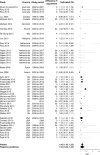Magnitude and modifiers of the weekend effect in hospital admissions: a systematic review and meta-analysis
- PMID: 31164363
- PMCID: PMC6561443
- DOI: 10.1136/bmjopen-2018-025764
Magnitude and modifiers of the weekend effect in hospital admissions: a systematic review and meta-analysis
Erratum in
-
Correction: Magnitude and modifiers of the weekend effect in hospital admissions: a systematic review and meta-analysis.BMJ Open. 2019 Jun 27;9(6):e025764corr1. doi: 10.1136/bmjopen-2018-025764corr1. BMJ Open. 2019. PMID: 31248933 Free PMC article. No abstract available.
Abstract
Objective: To examine the magnitude of the weekend effect, defined as differences in patient outcomes between weekend and weekday hospital admissions, and factors influencing it.
Design: A systematic review incorporating Bayesian meta-analyses and meta-regression.
Data sources: We searched seven databases including MEDLINE and EMBASE from January 2000 to April 2015, and updated the MEDLINE search up to November 2017. Eligibility criteria: primary research studies published in peer-reviewed journals of unselected admissions (not focusing on specific conditions) investigating the weekend effect on mortality, adverse events, length of hospital stay (LoS) or patient satisfaction.
Results: For the systematic review, we included 68 studies (70 articles) covering over 640 million admissions. Of these, two-thirds were conducted in the UK (n=24) or USA (n=22). The pooled odds ratio (OR) for weekend mortality effect across admission types was 1.16 (95% credible interval 1.10 to 1.23). The weekend effect appeared greater for elective (1.70, 1.08 to 2.52) than emergency (1.11, 1.06 to 1.16) or maternity (1.06, 0.89 to 1.29) admissions. Further examination of the literature shows that these estimates are influenced by methodological, clinical and service factors: at weekends, fewer patients are admitted to hospital, those who are admitted are more severely ill and there are differences in care pathways before and after admission. Evidence regarding the weekend effect on adverse events and LoS is weak and inconsistent, and that on patient satisfaction is sparse. The overall quality of evidence for inferring weekend/weekday difference in hospital care quality from the observed weekend effect was rated as 'very low' based on the Grading of Recommendations, Assessment, Development and Evaluations framework.
Conclusions: The weekend effect is unlikely to have a single cause, or to be a reliable indicator of care quality at weekends. Further work should focus on underlying mechanisms and examine care processes in both hospital and community.
Prospero registration number: CRD42016036487.
Keywords: Bayesian meta-analysis; adverse events; healthcare databases; mortality; systematic review; weekend effect.
© Author(s) (or their employer(s)) 2019. Re-use permitted under CC BY. Published by BMJ.
Conflict of interest statement
Competing interests: None declared. The views and opinions expressed herein are those of the authors and do not necessarily reflect those of the HS&DR Programme, NIHR, National Health Services or the Department of Health.
Figures


References
-
- House of Commons. Oral answers to questions: Health. London: House of Commons, 2015. https://publications.parliament.uk/pa/cm201516/cmhansrd/cm151013/debtext... (Accessed 7 Jan 2018).
-
- NHS England. Seven day hospital services: the clinical case. 2017. https://www.england.nhs.uk/seven-day-hospital-services/the-clinical-case/ (Accessed 7 Jan 2018).
-
- Triggle N. Stephen Hawking: I’m worried about the future of the NHS. 2017. http://www.bbc.co.uk/news/health-40967309 (Accessed 3 Mar 2018).
Publication types
MeSH terms
Grants and funding
LinkOut - more resources
Full Text Sources
Miscellaneous
